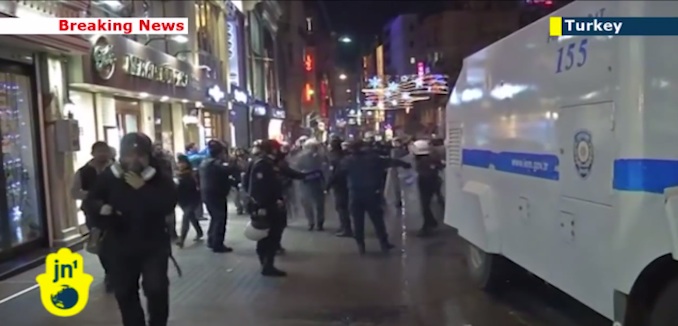The Washington Post this weekend began openly worrying that the political crisis shaking Turkey – in which a corruption probe driven by judiciary officials linked to U.S.-based cleric Fethullah Gulen has ensnared elites from Turkish Prime Minister Recep Tayyip Erdogan’s Justice and Development Party (AKP), who have in turn responded by moving to purge the judiciary of their opponents – may do long-term damage to “Turkey’s already fragile political institutions.”
In the end, however, voters rather than courts may determine the outcome of the crisis. Mr. Erdogan has begun stumping for local elections in March, seeking political vindication. If his party wins, he probably will press ahead with plans to increase the powers of the presidency before running for the job later this year. He makes no secret of his plans to remain in power until 2023, when Turkey will celebrate 100 years as a republic.
Neither Turkey nor the West would benefit from such a consolidation of power. The Obama administration and the European Union should be pressing Mr. Erdogan to respect the rule of law and give police and prosecutors the opportunity to present their cases in court.
Meanwhile the Turkish army has filed a sweeping complaint calling for an investigation into the trials of hundreds of retired and active-duty officers convicted over the years of anti-government activities. Erdogan and the AKP have used coup plot cases over the last decade to break the back and eventually exert control over Turkey’s once-powerful military. The political calculations in play are not straightforward. The systematic campaigns against the military were grounded in and justified by conspiracy theories of a “deep state” promoted by Erdogan and his AKP allies. That said, prosecutors and judges linked the Gulen movement played no small part in the mass convictions, and the new defense complaint directly accuses them of ignoring and misusing evidence. Opportunistic or tactical alignments between the army and the Gulenists are not impossible against the AKP – there is broad speculation that the Gulenist camp, though Islamist, will support secularists in the next election precisely to counterbalance the AKP – but such configurations are unlikely to be robust. Shifting alliances within and across rival Turkish camps may stymie efforts aimed at political stabilization.
[Photo: JewishNewsOne / YouTube]




